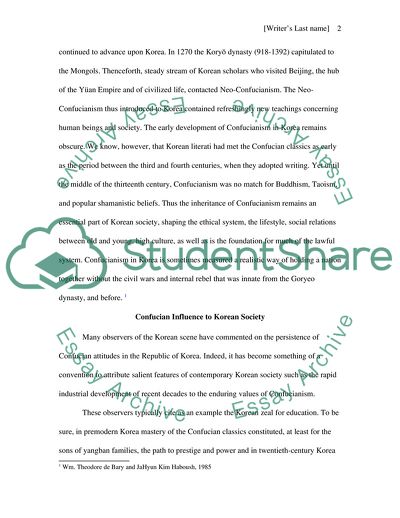Cite this document
(Confucian Influence to Korean Society: Social Structures and Women's Coursework Example | Topics and Well Written Essays - 1750 words, n.d.)
Confucian Influence to Korean Society: Social Structures and Women's Coursework Example | Topics and Well Written Essays - 1750 words. https://studentshare.org/social-science/1702806-confucian-influence-to-korean-society-social-structures-and-womens-status-in-yi-dynasty-choson1392-1910
Confucian Influence to Korean Society: Social Structures and Women's Coursework Example | Topics and Well Written Essays - 1750 words. https://studentshare.org/social-science/1702806-confucian-influence-to-korean-society-social-structures-and-womens-status-in-yi-dynasty-choson1392-1910
(Confucian Influence to Korean Society: Social Structures and Women'S Coursework Example | Topics and Well Written Essays - 1750 Words)
Confucian Influence to Korean Society: Social Structures and Women'S Coursework Example | Topics and Well Written Essays - 1750 Words. https://studentshare.org/social-science/1702806-confucian-influence-to-korean-society-social-structures-and-womens-status-in-yi-dynasty-choson1392-1910.
Confucian Influence to Korean Society: Social Structures and Women'S Coursework Example | Topics and Well Written Essays - 1750 Words. https://studentshare.org/social-science/1702806-confucian-influence-to-korean-society-social-structures-and-womens-status-in-yi-dynasty-choson1392-1910.
“Confucian Influence to Korean Society: Social Structures and Women'S Coursework Example | Topics and Well Written Essays - 1750 Words”. https://studentshare.org/social-science/1702806-confucian-influence-to-korean-society-social-structures-and-womens-status-in-yi-dynasty-choson1392-1910.


